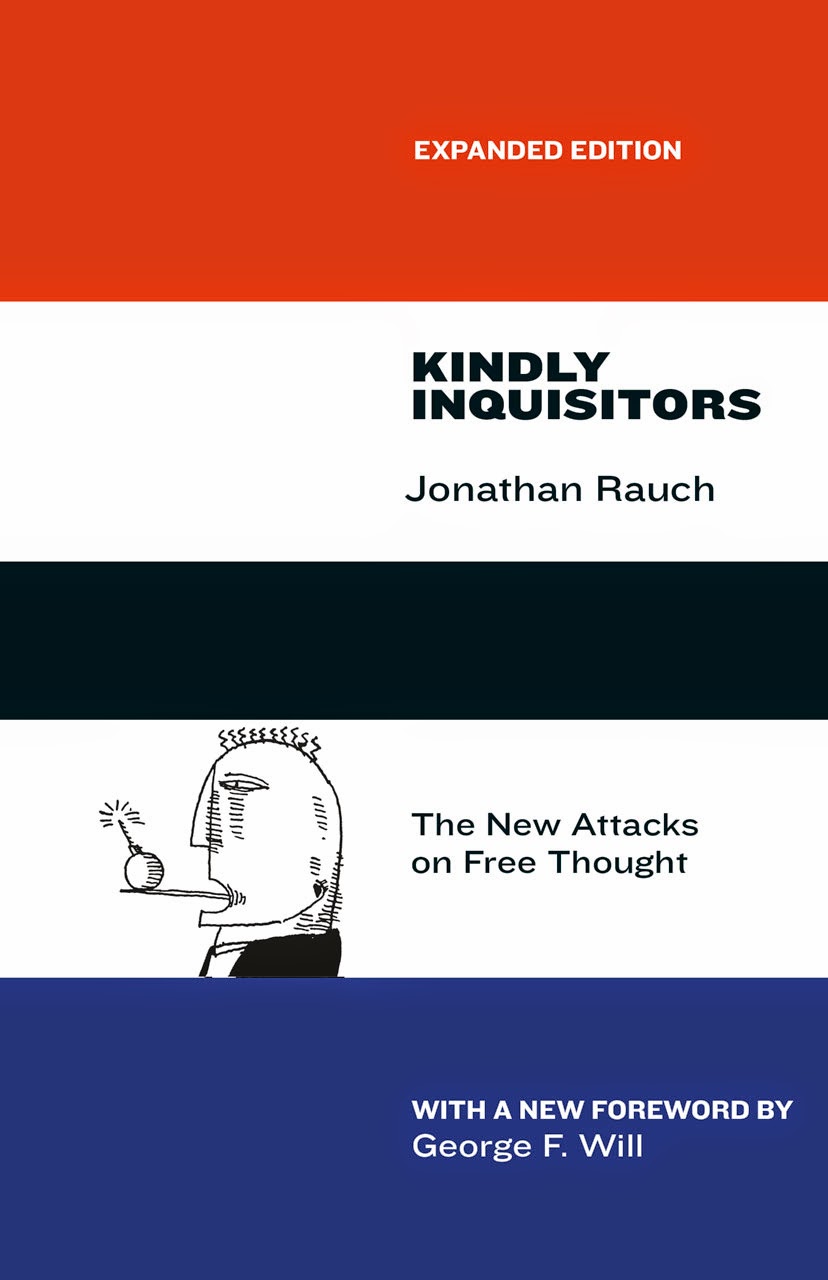Kindly Inquisitors
 Kindly Inquisitors: the New Attacks on Free Thought, by Jonathan Rauch
Kindly Inquisitors: the New Attacks on Free Thought, by Jonathan RauchOK, people, this is it. THIS is the best book I have read so far this year (in the non-fiction category, but way above most of the fiction too, I just don't want to dis DWJ here). And everybody should read it who plans to be a citizen of a country. Or ruler of their own one-person country, it would be important then too. You wouldn't want to oppress anyone, now would you?
In 1993, Rauch published this treatise about the importance of free speech, free thought, and the whole system he calls "liberal science." He used the then-current case of the fatwa against Salman Rushdie for writing The Satanic Verses as a special example of the importance of free speech. It was a timely book, what with the quick rise of political correctness on college campuses and all. Nobody paid a lick of attention, so in 2013 Rauch wrote another chapter and re-published the book.
Rauch explains exactly how and why our system of liberal science developed, asserting that it is our best method of determining truth. Who gets to decide what is true, what is correct, whose opinion is right? Well, if Plato had his way, it would be the wise philosopher-king.* Rauch points out that while this is a favorite system for those who plan to be philosopher-kings, it is not fair on everyone else. The only way is for everyone to get a chance to say what they think or what they have found out. If you can prove your data and convince everybody else, great; it goes in the science textbooks. If it's opinion or belief, you don't get to put it in a science textbook, but you can certainly try to persuade others of your point of view. What you don't get to do is decide that someone else's opinion, belief, or data is so awful that it should be silenced. Nobody ever gets that much power.
In fact, Rauch asserts strongly, offensive opinions are good for society. It gives the rest of us something to argue over and disagree with. It energizes debate and change.
In separate chapters, Rauch explores the dangers of the fundamentalist mindset (not necessarily a religious mindset, but that of someone who cannot tolerate the existence of other ideas) and the humanitarian mindset (the idea that not hurting people is more important than finding truth). He is upfront about the fact that the system of liberal science is a tough one that hurts a lot of feelings. There is going to be a lot of hurt and offense involved. But what the liberal science system does not do is physically hurt people, and that's often what happens if the liberal system is not allowed to flourish (see Rushdie's fatwa).
Rauch is really good at drawing careful distinctions and explaining fine points--for example, why can't we have creationist narratives in science books on the basis of giving equal time to differing systems of thought? Why shouldn't we ban hate speech in the interests of protecting minorities? He tackles every single objection to free inquiry and brings out the muddled thinking or disastrous consequences. It is so great.
Some random bits:
To believe incorrectly is never a crime, but simply to believe is never to have knowledge.My verdict: read this book. Buy it and read it and make your kids read it before they graduate from high school. Jonathan Rauch, if you ever read this, thank you for writing Kindly Inquisitors.
As knowledge-making regimes go, nothing is as successful or as respectful of diversity or as humane as liberal science. The trouble is that liberal science often does not look very humane. It uses sticks as well as carrots...Those sticks are nonviolent, true. But it is unconscionable not to admit that denying respectability is a very serious matter indeed...
If one is going to enjoy the benefits of living in a liberal society without being shamelessly hypocritical, one must try to be thick-skinned...it means that people who get righteously offended twice every day before breakfast should learn to count to a hundred--granted, that takes discipline--and say to themselves, "Well, it's just that person's opinion," before they charge out the door crying for justice....And it means that people receiving the complaints of the offended should count to a thousand before rushing out to do something out them. The alternative is to reward people for being upset. And as soon as people learn they can get something if they raise Cain about being offended, they go into the business of professional offendedness.
...we must not overlook the specific effects on minorities: it doesn't seem fair to sacrifice their interests on the altar of free speech. Do gays and Jews benefit from toleration of homophobic or anti-Semitic claptrap? I believe the answers are yes, yes, and yes. Society benefits from the toleration of hate speech, and so do targeted minorities... [Rauch is using those two examples because he is both gay and Jewish.]
*One of my very favorite things was how much Rauch dislikes Plato's Republic. I don't like the Republic either (I read it a while ago and you can see my opinion here), so that made me very happy.



Looks interesting! I'll have to put it on my list.
ReplyDeleteI think I will!
ReplyDelete